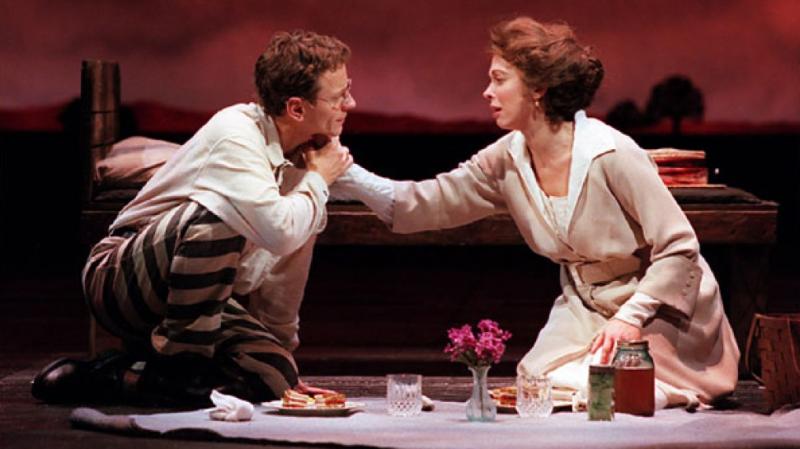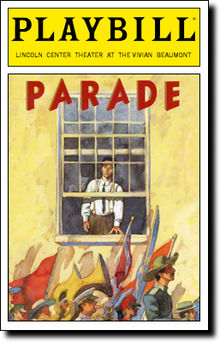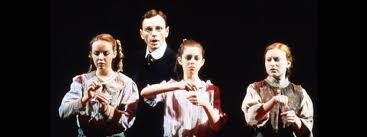BWW Blog: Parade and the Relevancy of Today
This summer, I've been taking 2 classes to try to entertain myself through the long summer weeks. I'm taking one class at NYU that is called "the outsider and its role in musicals theatre" which talks about how in musicals the concept and idea of the outsider is portrayed differently. We've talked about Hamilton, Sweeney Todd, Wicked, Cabaret, West Side Story and countless other musicals. Our final is to write an essay in which we choose a musical and explain the role of the outsider in it.
My other class I am taking at the University of Maryland (okaaay in state tuition) is called "spies, assassins, martyrs and witches: famous trials in American history". If you know me, you know in another life, I'm a lawyer. My proximity to DC feeds my politics minor but true crime is my THING. 24/7 you can find me listening to the iconic podcast, "My Favorite Murder".
 When the time came to pick which musical I was to write about for my NYU outsider class, I combined my two classes and loves and landed on one of my favorite musicals, Parade. Through my research, I've made discoveries that have made my musical theatre analysis brain endlessly happy as well as navigating through the 1913 trial of Leo Frank. In my essay that is in the very, very early draft phase, I've really looked into the character of the South. The people of Atlanta, Georgia are outsiders to the entire nation at the time. Georgia was the last state to enter back into the Union after the Civil War, leaving the state in severe economic troubles. When the North pushed their factories into the South, they were hesitant and looking for a scapegoat to push them over the edge in their hatred for the North. When Mary was killed and the trial began, Hugh Dorsey, leading prosecutor, begins with "people of Atlanta fought for freedom to their graves, and their city is a factory and their children are its slaves." Mary is the straw to break the camel's back in the South's hatred for the North, the people of Atlanta blame the North for Mary's death.
When the time came to pick which musical I was to write about for my NYU outsider class, I combined my two classes and loves and landed on one of my favorite musicals, Parade. Through my research, I've made discoveries that have made my musical theatre analysis brain endlessly happy as well as navigating through the 1913 trial of Leo Frank. In my essay that is in the very, very early draft phase, I've really looked into the character of the South. The people of Atlanta, Georgia are outsiders to the entire nation at the time. Georgia was the last state to enter back into the Union after the Civil War, leaving the state in severe economic troubles. When the North pushed their factories into the South, they were hesitant and looking for a scapegoat to push them over the edge in their hatred for the North. When Mary was killed and the trial began, Hugh Dorsey, leading prosecutor, begins with "people of Atlanta fought for freedom to their graves, and their city is a factory and their children are its slaves." Mary is the straw to break the camel's back in the South's hatred for the North, the people of Atlanta blame the North for Mary's death.
 The obvious outsider is Leo Frank, a Jewish, wealthy New Yorker, who runs the pencil factory which employed Mary when she died. When Dorsey is asked why he believes Leo is guilty he sings, "you want evidence? Look at those clothes and that big fancy talk!" He is convicted based on the fact that he is a complete outsider from the community.
The obvious outsider is Leo Frank, a Jewish, wealthy New Yorker, who runs the pencil factory which employed Mary when she died. When Dorsey is asked why he believes Leo is guilty he sings, "you want evidence? Look at those clothes and that big fancy talk!" He is convicted based on the fact that he is a complete outsider from the community.
I consider myself from the South and while I'm not from the deep parts of it, I've always felt like an outsider as well. I'm that super liberal chick who goes to school in New York. Through this essay and research, it's given me a greater understanding of just how the South was made and the effects of the Civil War that are still there almost 2 hundred years later.
The most poignant thing that stuck out to me was the phrase "the old red hills of home" which is the opening number of a young soldier about to enter the war. This phrase was actually on Mary Phagan's tombstone, "she died for the old red hills of Georgia." This really stuck with me in trying to navigate the racism in America and how to be a good ally. It captures just how ingrained racism is in the South's DNA. Racism didn't just "end" after the Civil War. Of course there was the Civil Rights movement, but it goes back so much further than Martin Luther King Jr. Racism has unconsciously become a norm in so many different parts of our lives and needs to be changed. Black lives matter. Black trans lives matter. Just a reminder to please use your white privilege for good and to normalize changing your opinion when presented with new information.

Comments
Videos


